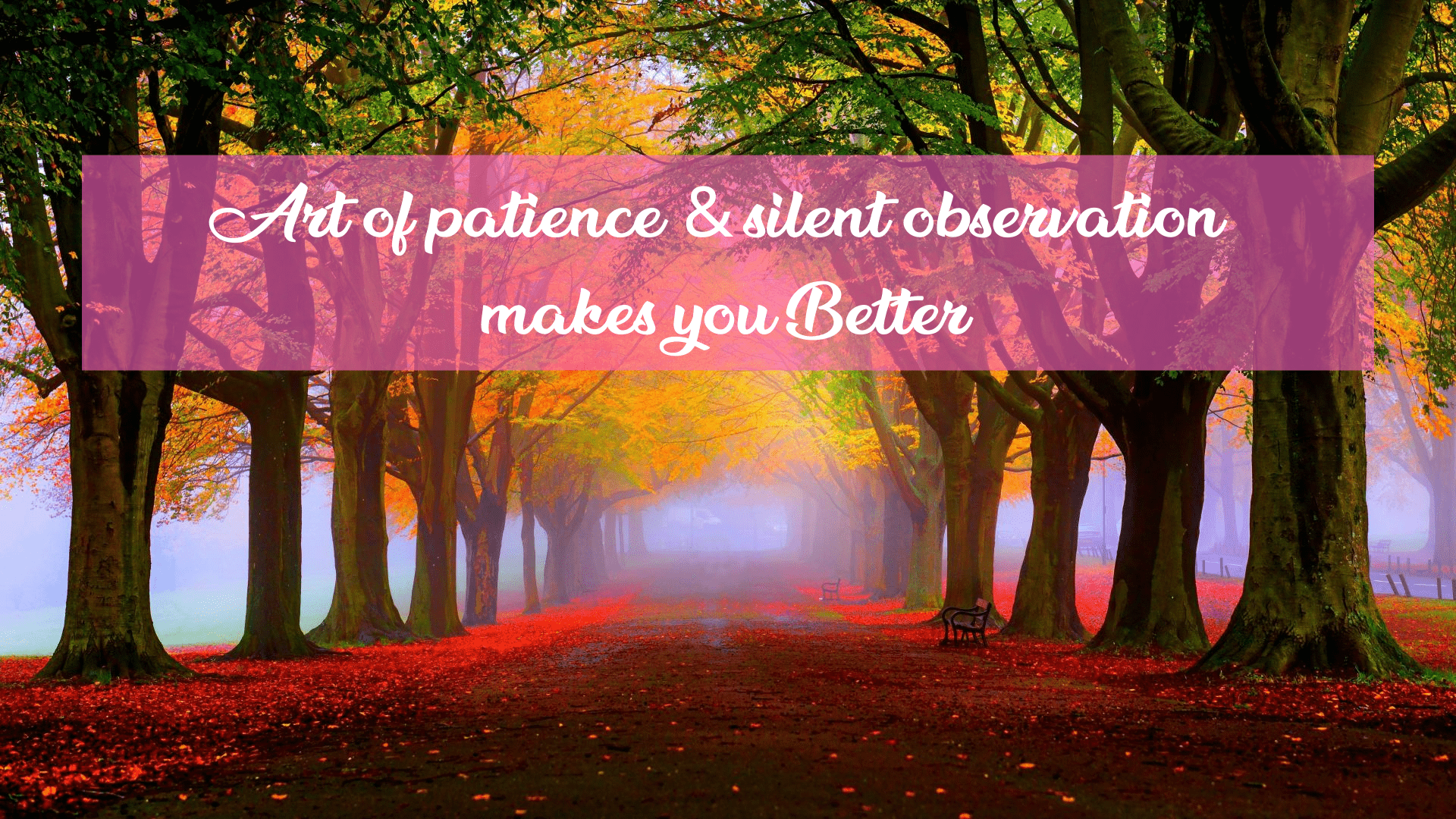
Toady’s topic regarding the art of patience and silent observation definitely deserves a good read to make your inner world better than before. A little research from the psychological and religious point of view is gathered here for you.
Patience is the ability to remain calm while anticipating a desired or needed outcome. It comes in three primary kinds, according to psychologist Sarah Schnitker‘s research: interpersonal patience, life adversity patience, and everyday difficulties patience.
Despite our impatience, life unfolds. Unfortunately, our impatience prevents us from completely appreciating the thrill and beauty of seeing it emerge. Then there’s the tension and dissatisfaction that comes with it.
Reduced impatience might help alleviate a lot of the world’s stress, especially today, with the fast pace of modern life. It’s good, then, that many of life’s lessons teach us how to be patient. The impatience of youth, for example, gives way to patience as maturity approaches. Because art is made, the artist’s impatience becomes patient. Because the destination is ultimately attained, driving in traffic becomes patient. I hope it’s making sense to you.
However, impatience may come at a high price. How many times has impatience in people’s lives resulted in things that could have been but never were: a true friend lost because five minutes of conversation could not be spared; poor grades in school due to a lack of attention to instructors and instructions; immeasurable and uncountable opportunities missed because judgment, anger, and anxiety, among other impatience byproducts, prevented people from ever realizing they existed.
How much, on the other hand, have our patience aided us in our lives? True loves, cherished friends, close confidantes, and other fulfilling relationships nurtured through mutual listening, empathy, and unconditional acceptance; a completed project at work owing to perseverance and attention to detail; a major breakthrough with a withdrawn child due to unwavering parental love, understanding, and patience.

Now, let’s talk about Silence!
Silence is basically a powerful tool for achieving awareness. Taking the time to reflect on your life will assist you in determining whether or not your life is running smoothly. You’ll be able to make intentional improvements to your life patterns after you become aware of the changes you’d like to see.
Silent observation allows you to observe events as they happen, revealing information, providing insight, clarifying ambiguity, and even shifting your opinion on some issues. Sometimes we talk too much and don’t listen to what someone is truly saying, or we don’t slow down enough to notice certain behaviors that might lead to additional investigation. I advise you to set aside a day to just observe, speaking only what is essential in order to have a better understanding of your interactions and circumstances.
Let us know the 5 amazing benefits of silent observation.
1. Silence makes you more concentrated in your observation
The capacity to focus when the contemporary world and its numerous noises hit your brain all at once is one of the key reasons why quiet has become an important element of everyday life. The capacity to concentrate on various tasks is frequently accompanied by some background noise.
When a volume exceeds approximately 80 decibels, the focus is almost always lost. You will be able to concentrate best in a quiet atmosphere or one with only a little background noise.
2. Silence makes you more creative
Without a question, creativity is a fundamental aspect of life, and stillness is a crucial component of the creative process. Silence has been demonstrated to be critical to an individual’s performance as they proceed through the creative process in some research. According to a Medium post, visionary geniuses like Albert Einstein and Sir Isaac Newton spent most of their careers working nearly entirely alone. The most creative work is generally accomplished alone or after a time of seclusion, according to psychoanalyst Ester Buchholz.
While brainstorming with others has its advantages, some of the finest creative work is done when the outside world is shut out and your art is the only thing on your mind.
3. Silence is a silent gateway to Awareness
Our environment is filled with many diversions and sounds. When your focus is constantly diverted, you may never find how to better your life. Silence, on the other hand, might help you become more conscious. Taking the time to reflect on your life will assist you in determining whether or not your life is running smoothly. You’ll be able to make intentional improvements to your life patterns after you become aware of the changes you’d like to see.
4. A sense of Calm through Silence
You may find it difficult to keep calm when dealing with the tensions and strains of life. One of the most challenging things of modern living is stress. According to the American Institute of Stress, around 77 percent of adults in the United States exhibit some physical indicators of stress in their daily lives. A daily hour of silence enables you to relax and lower your stress levels.
5. Patience through Silence
Many of us lose out on the advantages of being silent due to constant cacophony from the media and our daily lives. Almost everyone in today’s fast-paced environment has a short fuse for frustration. Learning to appreciate stillness promotes tranquility and peace. When you apply this technique on a regular basis, your tolerance for feeling impatient will likely increase as well. You’ll have greater tolerance in daily difficulties like traffic jams and lengthy lineups at the store if you learn to appreciate quiet times.
Patience is required for any form of achievement, as nothing comes easily. Allow yourself to reap the rewards by allowing things to happen at their own pace, rather than forcing them to happen.
What Religion lslam does say about the Art of Patience and Silent Observation?
Islam teaches that true patience comes after a catastrophe, that whoever is patient and suffers Allah would pardon them of their sins, and that if Allah wishes to do good to someone, HE will burden them with hardships.
Narrated Anas: The Prophet (ﷺ) said,
“The real patience is at the first stroke of a calamity.”
Prophet Muhammad (P.B.U.H)
In Islam, patience is always ‘been a prophetic culture’, a prophetic approach, and a prophetic lifestyle. It’s a really prestigious quality. It is a man-of-mission culture. All of the prophets maintained a patient and non-confrontational attitude.
Silence is regarded as one of the initial phases of prayer in Islam. Imam Ali ibn Abi Talib, one of Islam’s great leaders, once said that someone who talks less often possesses more wisdom. Quietness, according to Talib’s teachings, prevents superfluous discourse that might lead to lying.
The Prophet Muhammad (P.B.U.H) advocated for a broader form of quiet that leads to introspection. If your head is cluttered with frequent chatter, you won’t be able to think effectively.
In the last, Art of Patience and Silent Observation is definitely connected with your inner world’s power and strength. The more you have an art of patience and silent observations, the more you will be able to think more positively with strong mental health.




Leave a Reply